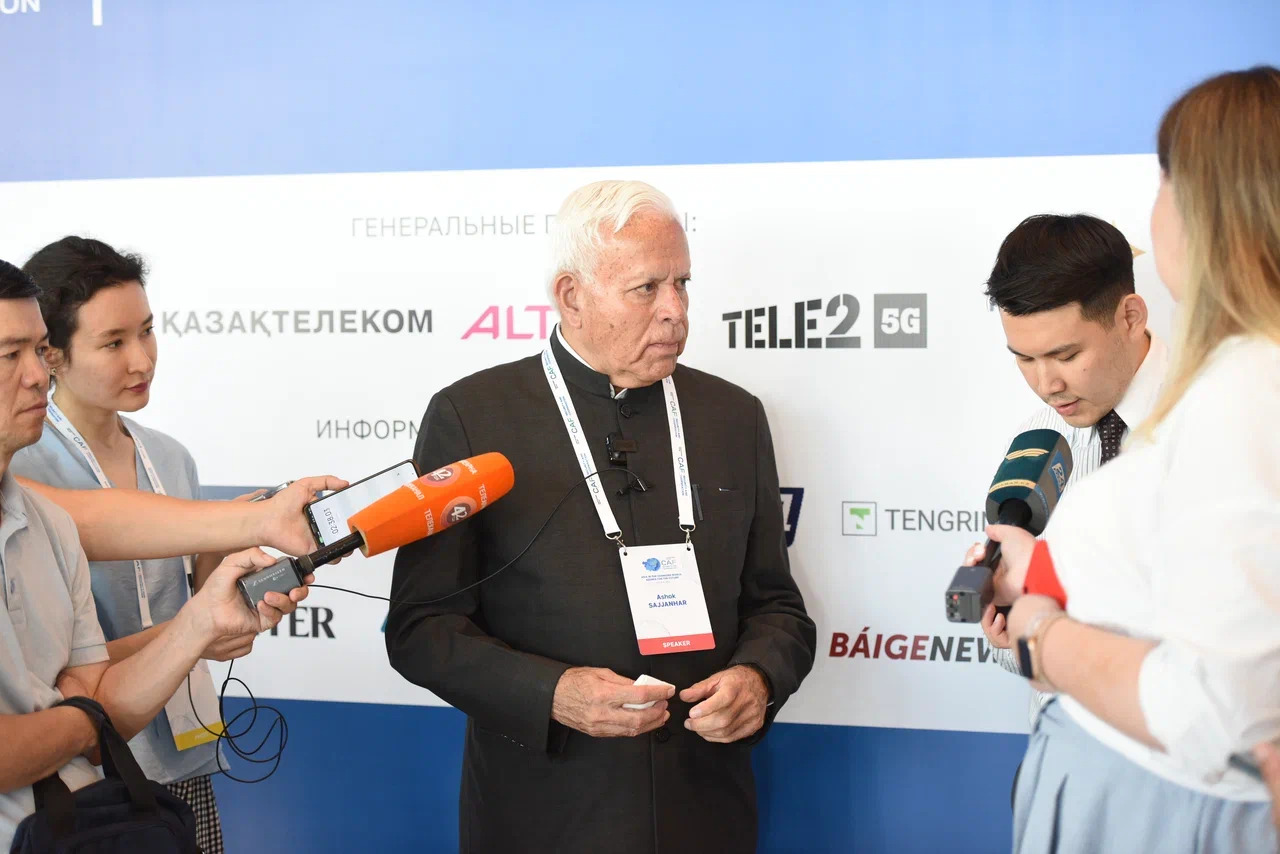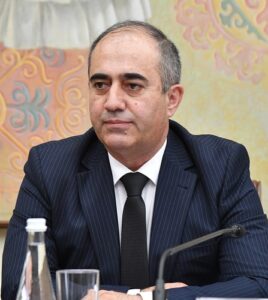ASTANA – International experts highlight the importance of addressing security challenges at a global level on the sidelines of the Central Asian Security and Cooperation Forum (CAF) taking place in Astana on July 13-14.

Ashok Sajjanhar, a research fellow at the Observer Research Foundation and president of the Institute of Global Studies in New Delhi. Photo credit: CAF press service.
Key discussions focused around security, climate change, and terrorism during the general session on the first day of the forum with Foreign Minister Murat Nurtleu outlining regional security priorities, including from the statement of President Kassym-Jomart Tokayev.
Ashok Sajjanhar, a research fellow at the Observer Research Foundation and president of the Institute of Global Studies in New Delhi, said the world should focus on advancing common security objectives as one “family.”
“India has a very important role to play in promoting peace, security and prosperity in Asia and the world. And our ethos is from our scriptures, which say that the whole world is a family. So, we have to look upon the whole world as a family, and we have to have win-win solutions for all the challenges and problems that the world faces,” he said.
According to him, economic development increasingly pivots to Asia, one of the fastest-growing regions in the world.
“Now the center of gravity of economic growth and development is shifting from the Transatlantic region to the Asian region. So far, all the economic growth has been taking place in the West, in Europe and in America. Now, it is said that much of the economic growth will take place in Asia, because most of the big economies, whether it is China, India, Indonesia, Vietnam, Korea, are all in Asia. So will Asia be able to realize the concept of the Asian century that Asia will be the most prosperous, the most developed region in the world? That is the question,” said Sajjanhar.

Ebtesam Al-Ketbi, president and founder of the Emirates Policy Center. Photo credit: CAF press service.
He also spoke about the role of Central Asia and Kazakhstan in contributing to that global shift towards Asian development.
“I think Kazakhstan and the whole of Central Asia has a very important role to play in this. Because Central Asia is truly the heart of Asia and Kazakhstan is the largest country in terms of territorial area. It is the largest country in terms of its GDP [gross domestic product],” he said.
According to Sajjanhar, Kazakhstan has done its part in strengthening security engagement within the region.
“In politics and strategic matters, Kazakhstan has always supported peace dialogue and communication. So I think Kazakhstan has a very important role to play. And the fact that Kazakhstan is organizing the Central Asia forum to speak about security and cooperation is an important testimony that Kazakhstan can play a very significant role,” said Sajjanhar.
Ebtesam Al-Ketbi, president and founder of the Emirates Policy Center, said countries should join a global alliance to address security issues because most of the challenges are not just regional, but global.
“Security has multi-dimensions. It’s not that classic security concept which was more about the military. Nowadays, we have many dimensions for security – health security after COVID-19, climate change and energy security,” she said.
“Nowadays with globalization, you cannot say that there is a specialty in terms of security for [one] region that is different for another region. All of us face food security and all of us are facing extremism. (…) So it’s not only Central Asia’s job or it’s not only the Gulf [region]’s job, it’s everybody’s job to cooperate,” she added.

Khairiddin Usmonzoda, director of the Center for Strategic Studies under the President of Tajikistan. Photo credit: dunyo.info.
Kazakhstan and the United Arab Emirates (UAE) share similar concerns about the impact of fossil fuel dependency, said Al-Ketbi.
“The Gulf region and the Central Asian region are both fossil energy producers. How [do] we cope and how [do] we make the transition with cooperation? It is not an easy solution to confront climate change because both of these regions, their budget, their economy is heavily dependent on their fossil energy,” she said.
Khairiddin Usmonzoda, director of the Center for Strategic Studies under the President of Tajikistan, underlined the importance of working closely with Central Asian allies to strengthen regional security.
“For Central Asia, security issues are of particular importance. Because the region borders unstable countries, like Afghanistan, this issue is ever more relevant. Many Central Asian countries share a common vision for enhancing security, be it economic security or strengthening borders,” he said.
Forums like CAF are the best answer to building a stronger security architecture and sharing security interests within the region, Usmonzoda suggested.
“Such forums are important for the development of further cooperation in order to conceptualize and formulate common security interests,” he said.
The role of analytic and strategic studies centers in addressing security issues are all the more significant, he noted.

